At What Age Do Shih Tzu Puppies Calm Down?
Small, sturdy bundles of adorable energy – this list of characteristics could very well describe Shih Tzu puppies.
And with its moderately high levels of playfulness and energy, many owners might be left wondering, “At what age will my Shih Tzu puppy calm down?”
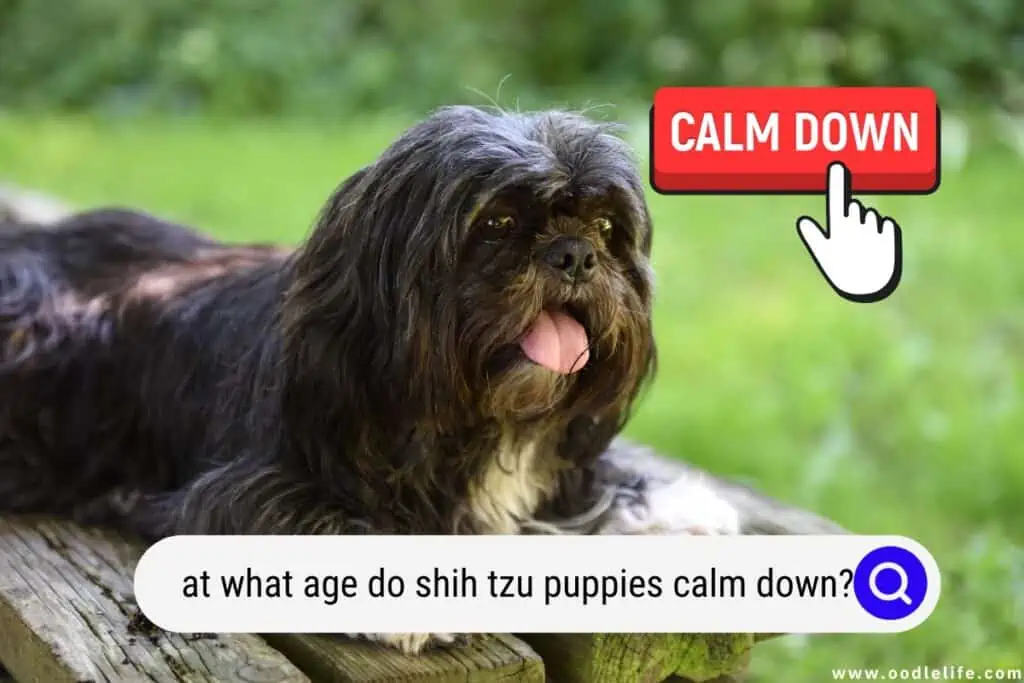
Breed Characteristics
As already mentioned, Shih Tzus are on the smaller side – their maximum size is around eleven inches tall and about sixteen pounds. They are highly social, playful, and loving creatures and do well even in smaller, apartment-like spaces.

Their size and breeding also make them susceptible to hip dysplasia, eye problems, and back problems. However, with a good breeder and veterinary care, you can somewhat reduce the risks of developing these issues.
Development Phases
Your Shih Tzu puppy’s energy level is often closely linked to its age.
Puppy
The puppy phase is divided into three parts: newborn, young puppy, and older puppy. A pup is considered a newborn if it is up to three weeks old; a young puppy between four weeks and four months old; and an older puppy if it is older than four months but younger than a year old.
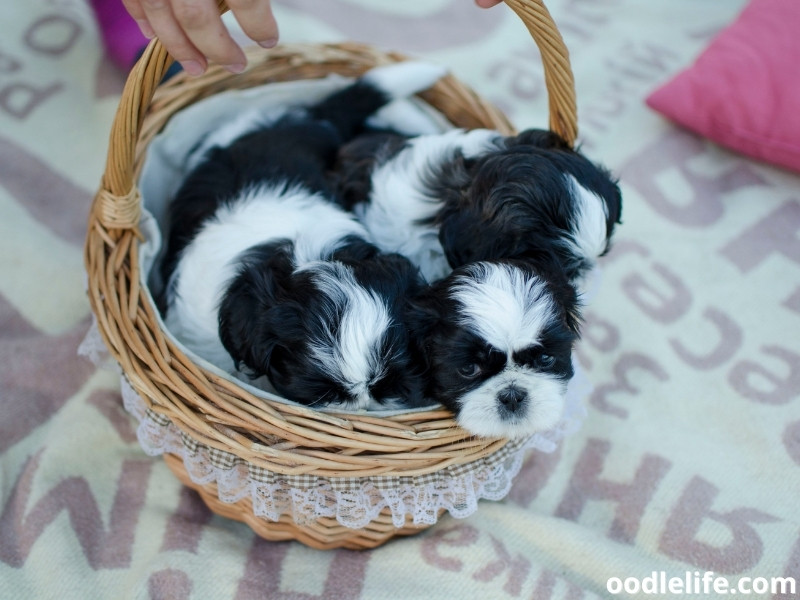
In the newborn phase, all the pup’s energy is devoted to learning to see, hear, move, and communicate. Young puppies experience the most changes in their development and environments, including teething, so it would make sense that they would have quite a bit of energy to match. Older puppies then enter an adolescent phase before mellowing out into adults.
Adolescent
Some dogs begin to calm down around six months to a year, depending on their temperament and training, but it is also possible for this to take a little longer. I know – not what you wanted to hear!
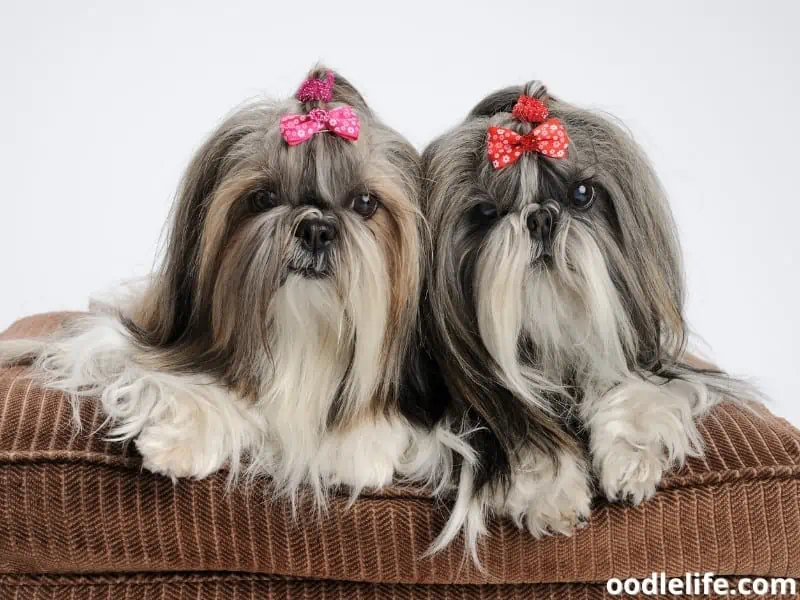
A Shih Tzu is considered an adolescent at approximately six months old. Like any human teenager, a Shih Tzu going through adolescence will also want to push its limits and challenge authority. This is probably the phase where you begin to wonder if your Shih Tzu puppy will ever calm down.
You will likely see some behavioral regression, particularly with obedience and potty habits, but do not give up on your dog or their training! Consistency is more important than ever at this stage, especially if you want a well-adjusted dog in the future.
Spaying or neutering your pup can also play a role in their behavior and energy levels. Veterinarians generally recommend neutering males at six months and females at about five or six months, before they go into heat for the first time. However, this decision is best discussed individually with your vet, and there are several reasons, including wanting to breed your Shih Tzu, for not “fixing” your pup.
Adult
Congratulations, you and your Shih Tzu puppy made it! From the age of one but certainly two years old, your Shih Tzu is considered an adult. While factors like a new environment will still impact their behavior and activity levels, this is the age that Shih Tzus will finally calm down.
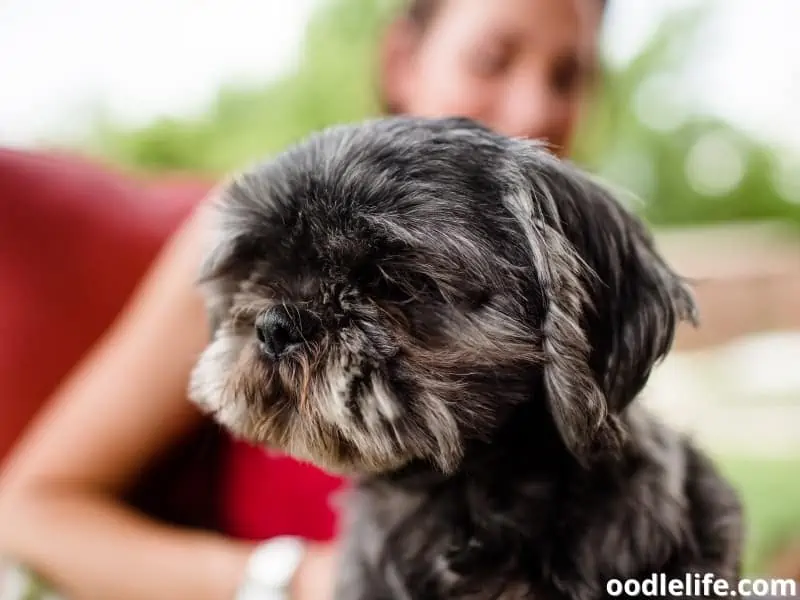
They become more relaxed, loving companions, especially if you have trained them properly. Now you can both enjoy the rest of their long lifespan a little bit more.
What To Do In The Meantime?
If your dog is currently in either the puppy phase or the teen years, I imagine it is a relief to know there is an end in sight. Here are some ways to help both you and your Shih Tzu enjoy the occasionally bumpy ride there:
Training
The best way to help manage your Shih Tzu puppy’s energy is through plenty of training. Obedience training and crate training can both help your relationship with your dog.
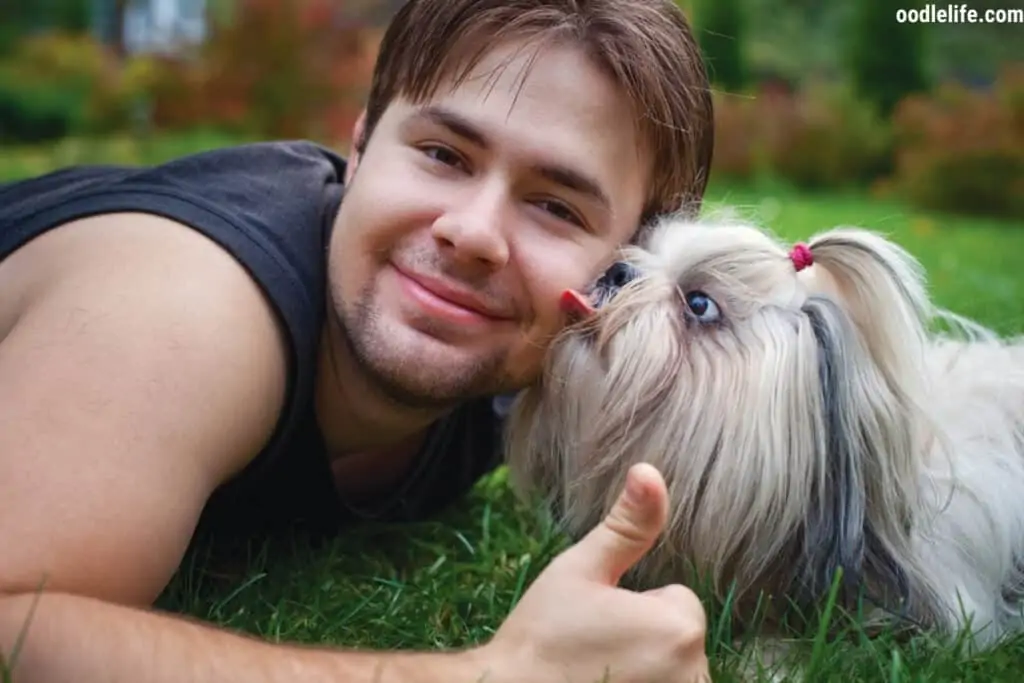
Obedience Training
Puppies can start learning basic commands as early as eight weeks old. Enrolling them in a class shortly after bringing them home provides them with extra structure and practice and you with extra support. Continuing classes through their “teen” months can also be helpful, as it reinforces your expectations for their behavior.
Crate Training
Shih Tzus often develop deep bonds with their owners. However, this can also lead to separation anxiety in puppies. One way to alleviate separation anxiety is through crate training.
When crate training your Shih Tzu, you must keep two main points in mind. First, make sure the crate is comfortable, but not too big. Your puppy should have enough room to stretch, sit, stand, turn around, and lay down, but not so much space it can use a corner of it as a toilet.
Second, make sure to associate the crate with positive experiences. Introduce the puppy to the crate by placing a treat inside and praising them when they go inside to investigate. Once the dog is more comfortable with its new crate, give it a puzzle toy while inside for entertainment.
Never use the crate as a punishment, as this will create anxiety and resistance to using it.
No matter what kind of training you do with your Shih Tzu, consistency and positive reinforcement are key. This breed is typically eager to please and responds well to praise and rewards. Help your Shih Tzu feel successful by communicating your expectations clearly and providing plenty of admiration and affection when they fulfill them.
When possible, it is best to ignore poor behavior rather than respond harshly, as Shih Tzus crave attention and will do anything to get it.
Exercise
One way to help that hyper puppy is to ensure that your Shih Tzu is getting enough exercise, both physically and mentally. Since Shih Tzus are so small, a few rounds of fetch in the house can easily supplement a minimum of two twenty-minute walks a day.
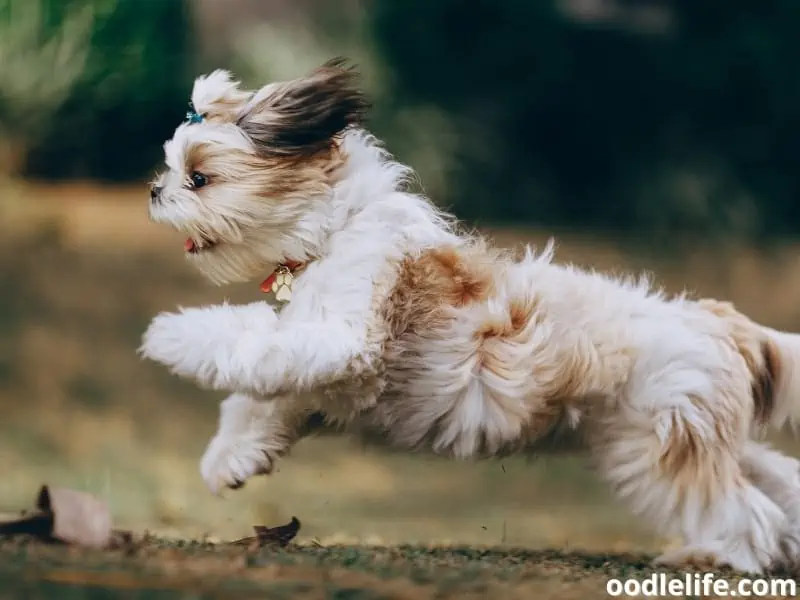
Shih Tzus are also an intelligent breed that often loves puzzle toys. And once they’re worn out from a walk, they will likely be more open to learning new tricks. As the saying goes, a tired dog is a good dog.
Socialization
Shih Tzus can be social butterflies. They love attention and affection from their humans, and often enjoy the company of their doggie counterparts, too.
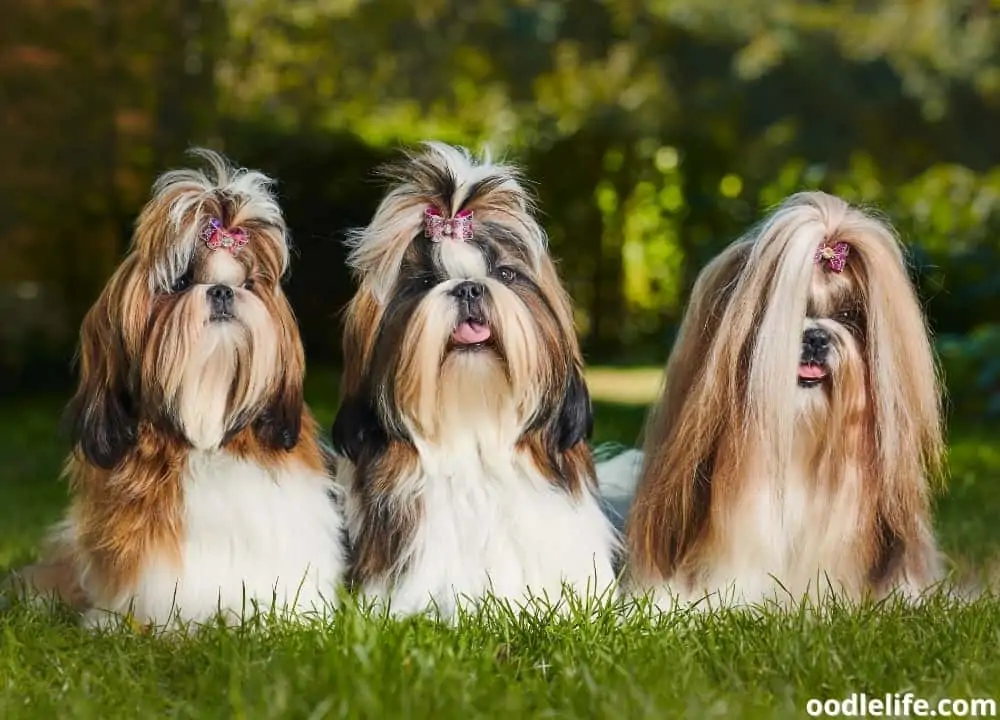
A good routine and plenty of attention, especially for good behavior, will keep your Shih Tzu very happy. If you think they’re ready, taking them to a dog park will help burn off some of that energy while also meeting their canine socialization needs.
Other Methods
If the above tips and tricks are not helping your hyperactive Shih Tzu, there are a few other options you can explore.
Aromatherapy
Essential oils can help not only humans but also pets calm down and relax. Some helpful essential oils for anxious dogs are lavender, rose, and valerian root.

Discuss any essential oil treatment with your veterinarian beforehand. And never let your pet ingest essential oils, as their highly concentrated contents can be toxic.
Gabapentin and L-Theanine Supplements
Another route to consider for a nervous Shih Tzu is supplements. Gabapentin is an anticonvulsant that can also help calm your dog. L-Theanine increases GABA compounds in a dog’s brain, leading to more relaxation, peace, and feelings of well-being in your pup.
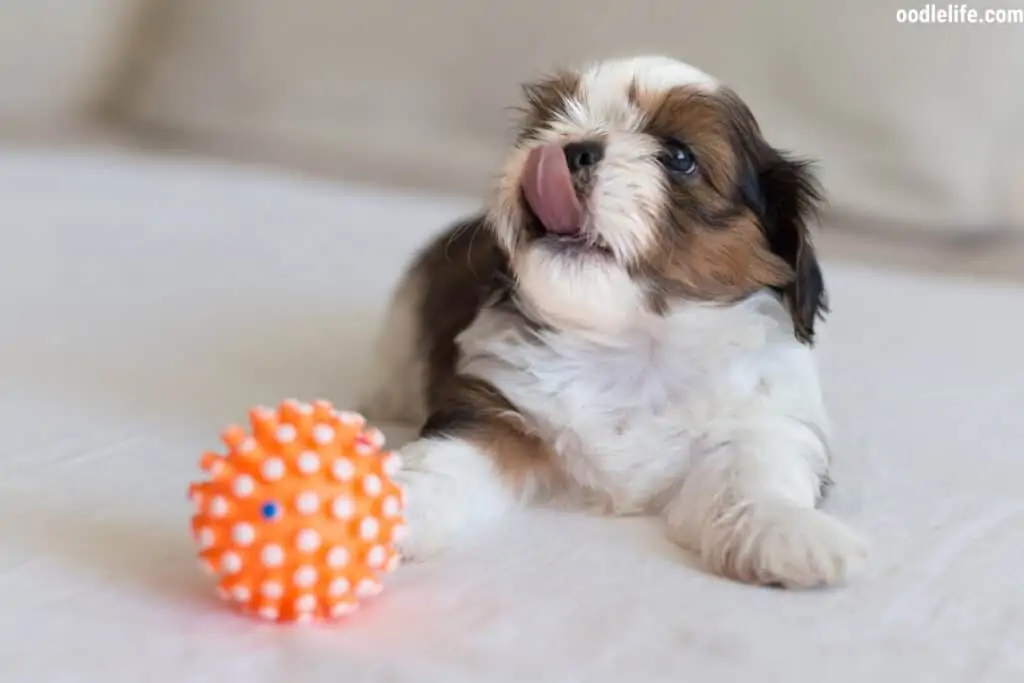
Again, discuss these options with your veterinarian first.
Wrap Up
Shih Tzus are loving and playful companions. They also come with a large portion of energy!
Some ways to manage this are by ensuring they are properly trained, get plenty of exercise and movement, and receive sufficient attention from you and other dogs. If all else fails, talk to your vet. Perhaps aromatherapy or supplements can help, especially if some of that hyperactivity stems from anxiety.
And remember – they will start chilling out once they hit adulthood!